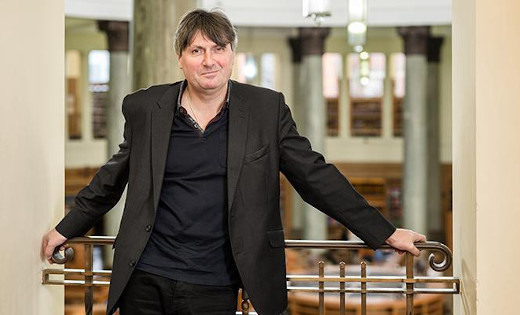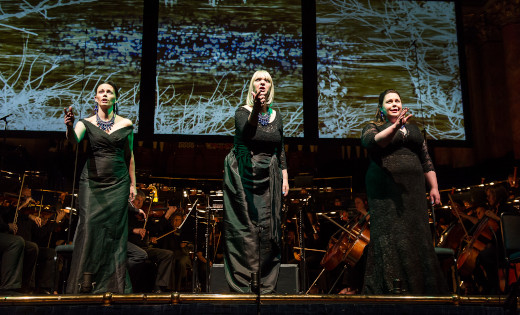Inside Track – Professor Frank Finlay: How creativity transcends isolation
The bewildering and dramatic shift to an unprecedented, peacetime lockdown has left many of us reeling. Here, Professor Frank Finlay explores the delivery of ‘culture’ at the time of a pandemic.

Three weeks ago after a working visit to London, I took my son and his girlfriend out to celebrate his 21st birthday: dinner in a bustling restaurant, a sold-out West End theatre, one for the road in a pub and the parting of ways onto a packed Tube.
That kind of night out – or any night out – was simply unthinkable barely a matter of days later; just one small example of the speed, depth and breadth of the massive disruption we have all been experiencing.
Reflecting a world turned upside, it has been remarkable, in the meantime, to witness how certain hardened positions have apparently dissolved overnight. Now, governing politicians are seemingly content to defer to expert opinion, for example, praise the Civil Service and recognise the value of the BBC. Perhaps the best example of the many discursive cartwheels being thrown is the rediscovery of what should count as ‘essential work’. And, lest we forget, we have just witnessed the effective nationalisation of much of the economy!
The bewildering and dramatic shift to an unprecedented, peacetime lockdown has left many of us reeling, while the full enormity of our predicament is only now being captured in the daily news cycle. It has been telling how, in efforts to make sense of it all, people have turned to artistic representations of past pandemics. Daniel Defoe’s A Journal of the Plague Year is just one of the many literary works to trend, while what Shakespeare might or might not have written while in enforced self-isolation turned into a lampooning social media event.
 Simon Armitage, Poet Laureate and Professor of Poetry at Leeds
Simon Armitage, Poet Laureate and Professor of Poetry at Leeds
Closer to home, our Professor of Poetry, the Poet Laureate Simon Armitage, has produced the memorable poem, Lockdown, to address the coronavirus, drawing on the outbreak of the Bubonic Plague in the 17th Century in a Derbyshire village and also referencing an epic Sanskrit poem. Poetry, Professor Armitage reminds us, can be consoling in times of crisis because “it asks us just to focus, and think and be contemplative”.
The same might be said of a whole range of art and cultural practice, as demonstrated by the millions of us finding solace in richly diverse forms of culture, or coming together in virtual spaces to create it ourselves, from music to mass pub quizzes. At the same time, we have witnessed how other creative artists and practitioners, as well as a legion of amateur enthusiasts, have found ever more ingenious ways of producing and sharing works from behind closed doors. Creativity is self-evidently essential to transcend isolation, maintain social ties and sustain and unite people across national borders. It is arguably also a marker of what makes us human, as the response to stirring TV images of Italians serenading one another from their balconies demonstrated.
In the same way that universities have been able to move their staff and students to digitally-enabled remote working at pace, advances in technology have meant that the delivery of ‘culture’ at the time of a pandemic is far more feasible and effective than would have been the case only a decade ago. An example of online content being made available for free would be our DARE partners Opera North’s multiple award-winning 2016 production of The Ring. Amongst other things, the explosion of digital is transforming our understanding of what is possible from ‘home’, to a degree redefining and reshaping what that space could be in each case, while at the same time raising urgent questions about the long-term desirability of these developments. It is also transforming everyday speech; within days, colleagues started to ask us if we had “time to Zoom” or “do a Teams”.
 Opera’s North’s The Ring, performed at Leeds Town Hall. Picture by Clive Barda
Opera’s North’s The Ring, performed at Leeds Town Hall. Picture by Clive Barda
Part of the role of galleries, museums, theatres, concert venues, clubs and festivals is to create communal space; they thrive on hospitality, opportunities for human contact and social interaction. The current restrictions leave them facing enormous challenges, not least because their buildings and spaces also help to drive vital revenue streams from gift shops, cafés and restaurants, and as bookable sites for events. Given that the lights went out on cultural venues pretty much overnight, there must be no understating the existential threat they are facing, particularly if the lockdown measures were to continue beyond the short term. Just as well that, amongst many others, the Arts Council and the BBC have put support programmes in place, with the latter’s ‘Culture in Quarantine’ initiative pithily capturing the state we are in.
So, it will be fascinating to witness at first hand, and report on, how the Cultural Institute’s local creative partners – and the wider creative sphere of activity – are able to respond to adversity, as well as what this all might mean for the arts and culture world beyond the covid-19 pandemic. The early indications are hugely impressive. It will also be interesting, not least, to see what new works are created that might not otherwise occur, how they are influenced by the medium of dissemination, and what all this might mean for future live performance.
There are also already early signs of organisations rethinking their activities in radical ways in order to serve their communities, as our partners the Ilkley Literature Festival have been quick to do. Perhaps the best example anywhere of what is possible when rethinking the role of artists and arts institutions is Leeds’s own Slung Low – a theatre company transformed in a few short days into a community hub to connect individuals across Holbeck with access to food, essential supplies and human connection during the lockdown. Our colleague, Dr Kara McKechnie (School of Performance and Cultural Industries), is spending her time as Slung Low’s dramaturg, chipping in to provide on-the-ground support for the local community – possibly not the role she was expecting to play, but a vital one, nonetheless.
As for the Cultural Institute, my colleagues and I remain very much ‘open for business’. In the weeks and months to come, we will be continuing to progress projects with Leeds academics and external collaborators, offering support and advice as well. We have already been finding imaginative ways of doing so – remotely and necessarily differently, of course – but we hope just as effectively!
We are also engaging creatively with our cultural partners, with Leeds 2023, the Leeds International Piano Competition and important networks, such as Culture Forum North, a consortium of 75 Higher Education and Cultural institutions, and the Leeds Arts Health and Wellbeing Network, which brings together more than 1,000 individuals in the arts, academic and health sectors. Both forums are administratively hosted by the Cultural Institute, and we will work with our colleagues, Clare Jackson and Geraldine Montgomerie, as they offer support and partnership to cultural and educational organisations during the coming weeks.
Examples of 'Culture in Quarantine' at the University
- stage@leeds is launching a digital platform for creatives working in digital environments. stage@leedsDigital will also provide students with resources and forums to discuss technical questions, as well as an opportunity to premiere student and professional work.
- Leeds University Library Galleries continues to run events online, including a weekly sketch-along Sketch Club hosted on Twitter and Instagram, which ‘draws’ inspiration from the University's Special Collections, and Pen to Paper, a creative writing activity every Wednesday.
- Arts and Humanities Outreach Team hosted its first 'National Art and Design Saturday Club' online, engaging young people aged 13-16 with arts education at home.
- 63 Fine Art students are curating online interventions, including Instagram takeovers and interviews with the artists, ahead of SIMMER, the first digital BA Fine Art Degree Show.
I will be shining a light on these and related activities in future blogs, but in the meantime stay safe and #StayAtHome